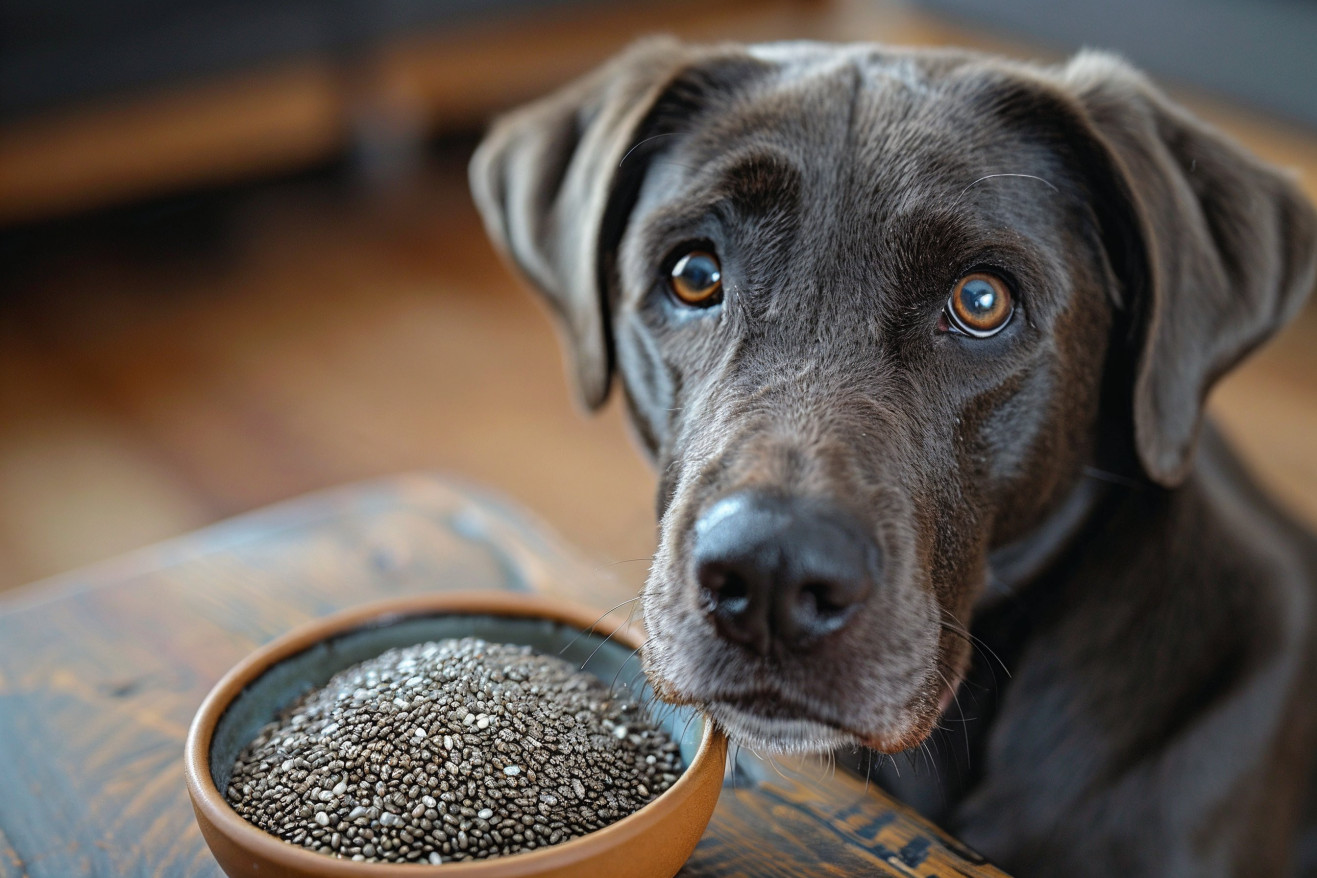Can Dogs Eat Chia Seeds? An In-Depth Review
4 April 2024 • Updated 3 April 2024

From the moment you first learned that chia seeds are a superfood to the time you started thinking about their potential as a dog treat, you may have found yourself asking whether or not you should add these nutrient-dense seeds to your dog's diet. Chia seeds can be a good addition to a dog's diet as long as they are given in moderation. They are packed with fiber, protein, antioxidants and omega-3 fatty acids, all of which offer a number of nutritional benefits. That said, they should be introduced slowly and given in the correct portion based on your dog's size to avoid any potential digestive upset.
To help you figure out whether or not chia seeds are a good choice for your dog, we've taken a deep dive into the research from veterinary nutritionists and other pet professionals. This review will look at the important nutrients in chia seeds, the potential health benefits of giving them to your dog, the right portion sizes for different breeds, and any potential dangers or side effects. By the end, you should have a good idea of how chia seeds can affect your dog's health.
Can dogs eat chia seeds?
Nutritional Benefits of Chia Seeds for Dogs
Chia seeds are full of important nutrients that can have a big impact on a dog's health. One of the most notable is their high fiber content - chia seeds contain 34 grams of fiber per 100 grams. This can help with digestion, prevent obesity by making dogs feel fuller, and even help with issues like constipation and anal gland problems, according to Dogs Naturally Magazine.
Another important benefit is the omega-3 fatty acids found in chia seeds, particularly alpha-linolenic acid (ALA). Although dogs can convert ALA into other forms that are more easily used by the body, the antioxidant benefits of ALA are still important, as they can help with skin and coat health, reduce inflammation, and even improve cognitive function. Research mentioned by Yumwoof has shown that chia seed oil can even help reduce arthritis symptoms by reducing inflammation.
In addition to fiber and fat, chia seeds are also full of antioxidants, including quercetin, caffeic acid and myricetin, which can help protect the heart, liver and even have anti-cancer effects. They also contain a variety of essential vitamins and minerals like calcium, iron, magnesium, zinc and phosphorus - all of which help with bone strength, dental health and overall wellness.
While chia seeds are very nutritious, it's important to note that they should be used as a supplement in a dog's diet, not a primary food source. When given in the right amounts and in combination with a well-rounded diet, their special nutrients can help improve a dog's health.
Portion Sizes and Diet Tips
If you're planning to add chia seeds to your dog's diet, it's important to introduce them slowly and in small amounts. Ollie Blog suggests a portion size of 1 teaspoon per 10 pounds of body weight, which can be mixed in with your dog's regular food. This way, you can see how your dog reacts and how their digestive system handles the seeds before you increase the amount.
To ensure that your dog can digest the chia seeds properly, Sundays for Dogs recommends grinding or soaking the seeds before you give them to your dog. You can grind the seeds in a coffee grinder or blender to help your dog's body break them down, or soak them in water or broth for 10-15 minutes to soften them. This step is important to avoid any potential blockages or choking hazards.
You can add chia seeds to your dog's diet by sprinkling them on top of their regular food or mixing them into homemade treats. Cherish Pet Food warns against feeding chia seeds to dogs in their dry form, as this can cause digestive problems.
As with any new addition to your dog's diet, it's important to talk to your vet before you start giving your dog chia seeds, especially if your dog has any dietary restrictions or health issues. They can help you figure out the right portion size and frequency for your dog's unique needs.
Potential Risks and Side Effects
Although there are many benefits to feeding dogs chia seeds, it's important to be careful when introducing and feeding them to your pet. According to Bone Voyage Dog Rescue, the high fiber content in chia seeds can cause digestive problems, including diarrhea or constipation, if they are given in excessive amounts or if the dog is given too much too soon. To prevent this, they suggest starting with small amounts, such as 1/4 teaspoon per 10 pounds of body weight, and gradually increasing the amount as the dog's digestive system becomes used to it.
Another potential risk is that chia seeds can cause intestinal blockages or choking hazards if they are not prepared correctly. According to Green Matters, you should soak or grind the seeds before giving them to your dog to make them easier for the dog to digest. If you don't, the seeds can be hard for dogs to chew and can become lodged in their esophagus or intestines.
Some dogs may be allergic to chia seeds, which are part of the mint family. According to iHeartDogs, you should watch your dog for signs of an allergic reaction, including itching, hives, or vomiting, after you first give them chia seeds. If you notice any of these symptoms, stop giving your dog chia seeds and contact your veterinarian.
Chia seeds may not be safe for dogs with certain health conditions. According to iHeartDogs, you should not give chia seeds to dogs with diabetes or kidney disease without first talking to your vet because the high fiber content in chia seeds could make these conditions worse. If your dog accidentally eats too many chia seeds, take them to the vet immediately and watch for signs of discomfort.
Chia Seeds in a Healthy Diet
Although chia seeds can offer some health benefits to dogs, they should not be used as a substitute for a well-balanced diet. PetHonesty notes that chia seeds should be considered a supplement and not a replacement for a high-quality, nutrient-rich commercial dog food.
Make sure to talk to a vet or pet nutritionist to make sure that the rest of your dog's diet is meeting all of their nutritional needs. Sundays for Dogs says that chia seeds can be added to a diet that includes a complete, balanced dog food as well as other supplements or treats that are good for your dog.
You can also get more out of chia seeds by adding them to other superfoods or supplements like coconut oil, turmeric, or probiotics. Healthy Paws Pet Insurance adds that chia seeds can be used as a supplemental ingredient in meals or treats that are packed with other nutrients. This way you can make sure that your dog is getting all the benefits of chia seeds while also making sure they are getting everything they need from their diet.
Conclusion: A Nutritious Supplement When Used in Moderation
Chia seeds can be a nutritious supplement for dogs when used in moderation. They are a rich source of fiber, omega-3 fatty acids, antioxidants, and essential vitamins and minerals.
The fiber in chia seeds can help with digestion, prevent obesity and constipation, and even help with anal gland issues. The omega-3 fatty acids, especially alpha-linolenic acid (ALA), can help reduce inflammation, which can help with skin and coat health and cognitive function. The antioxidants in chia seeds can help protect the heart, liver, and may even have anti-cancer properties.
However, while chia seeds are nutrient-dense, it's important to introduce them slowly and in the right amounts based on your dog's weight. Ollie Blog suggests starting with 1 teaspoon per 10 pounds of body weight, and Sundays for Dogs recommends soaking or grinding the seeds to make them easier to digest. It's also a good idea to talk to your vet, especially if your dog has any dietary restrictions or health issues.
The potential downsides of chia seeds include digestive issues, blockages, and allergies. Bone Voyage Dog Rescue warns that overfeeding can cause diarrhea or constipation because of the fiber content. To avoid these issues, it's important to prepare and introduce chia seeds carefully.
It's also important to remember that chia seeds should be used as a supplement to a complete and balanced diet, not a replacement for it. PetHonesty stresses the importance of talking to a vet or pet nutritionist to make sure your dog is getting everything they need from their diet. When used in combination with other nutritious foods, chia seeds can help support your dog's health.


